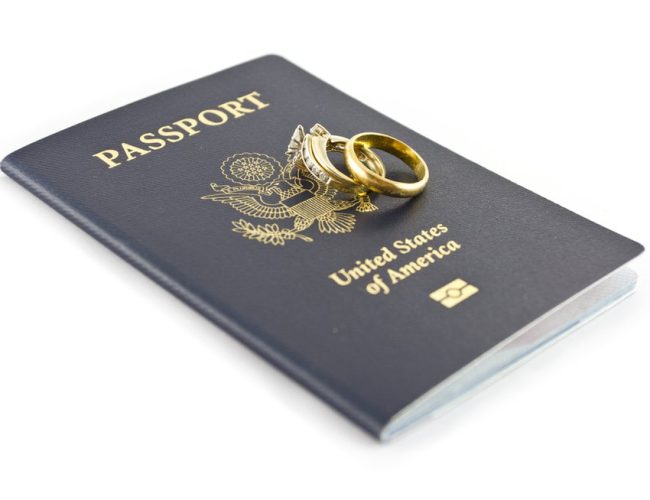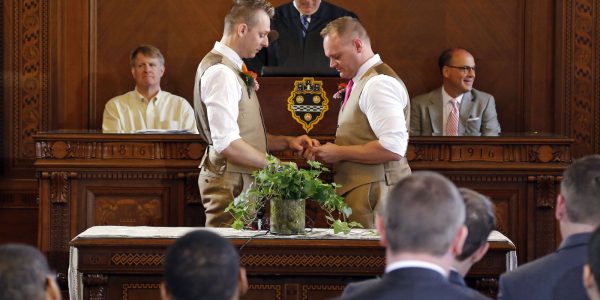
Special rules in US. Immigration law allow permanent residents applying for citizenship through wedding to submit the applying when simply three years. Most permanent residents should live in the US for a minimum of five years before applying for citizenship. However, the spouse of a US. Citizen who resides in the US also be eligible to file Form N-400, Application for Naturalization, on the premise of his or her wedding when simply three years.
The Immigration and Naturalization Act (INA 319(a)) describes the special provisions for the spouse of a US. Citizen who needs to become a citizen. The spouse should have incessantly resided within the US. when changing into a permanent resident for a minimum of three years like a shot preceding the date of filing the naturalization application and should have lived in married union along with his or her US. spouse relation for a minimum of three years before filing.
Citizenship through Marriage Requirements.
If you are applying for U.S. citizenship through marriage, you must meet many criteria so as to qualify.
- Age must be 18 or older at the time of filing;
- Be a lawful permanent resident at the time of filing the N-400 application;
- Living in marital union with the US. citizen spouse for at least three years preceding the naturalization application. (The citizen spouse must have been a U.S. citizen for those three years.);
- Continue to be the spouse of the US. citizen up until the time you take the Oath of Allegiance;
- Be continuously residing in the United States as a permanent resident for at least three years immediately preceding the date of filing the application and up to the time of naturalization;
- Be physically present in the United States for at least 18 months (548 days) out of the three years immediately preceding the date of filing the application;
- Live within the state or USCIS district with jurisdiction over the applicant’s place of residence for at least three months prior to the date of filing;
- Demonstrate an understanding of the English language, including an ability to read, write, and speak words in ordinary usage;
- Show a knowledge and understanding of the basic of the history and principles and form of government of the United States (civics);
- Demonstrate sensible ethical character for at least three years prior to filing the application until the time of naturalization; and
- Show attachment to the principles of the US. Constitution and well-disposed to the good order and happiness of the United States during all relevant periods under the law.
The Citizens Test Online course can help you confirm your eligibility by providing you with a Form N-400. In fact, we’ll make sure you meet the requirements before you pay for the service. Permanent residents use Citizens Test to easily and correctly prepare USCIS forms like Form N-400, Application for Naturalization.
Citizenship through marriage Isn’t necessary.
In several cases, the spouse of a US. citizen might also qualify on the basis of five years continuous residence as a permanent resident. Applying for citizenship through marriage isn’t necessary just because you are married to a US. citizen. If you are married to a US. citizen and you also have five years of permanent residence in the United States, you can likely have two different options for filing Form N-400. USCIS does not require you to apply for citizenship based on the marriage. Generally, it is easier to prepare an application when applying for citizenship based on five years as a permanent resident. That’s because it won’t be necessary to submit additional documents about your marriage and US. citizen spouse.
Marital Union Requirement

If you’re applying for citizenship through wedding to a US Citizen, there’s a marital status union requirement. Usually you need to be living in marital status union together with your US Citizen Spouse equivalent for a minimum of three years instantly preceding the time of filing the N-400 application. This provision needs that you simply board marital status union with the Citizen Spouse equivalent throughout the whole amount of there years before filing. USCIS considers you to be “living in marital status union” with your Citizen Spouse if you and the Citizen truly reside along.
Factors that may disrupt this period of living in marital status union include:
- Death of U.S. citizen spouse.
You are ineligible to naturalize as the spouse of a US. citizen if the citizen dies any time prior to you taking the Oath of Allegiance. However, if you are the surviving spouse of a US. citizen who died in military service, you’ll be eligible for naturalization under another special provision.
- Divorce or annulmen
A divorce or annulment will break the marital relationship. Thus, you’re ineligible to naturalize as the spouse of a US. citizen if you or your spouse terminated the marriage through divorce or annulment.
- Separation
A separation (legal or informal) usually includes living at separate residences. As a result of you’re now not truly residing together with your U.S. citizen spouse following a separation, you’re also not living in marital union with the US. citizen spouse, and you’re not eligible to apply.
If you were subjected to scrap or extreme cruelty by your US. citizen spouse, you’re seemingly exempt from this requirement. If any of the above conditions apply to you, please seek the advice of an experienced immigration lawyer before filing a Form N-400, Application for Naturalization.
Three Years of Continuous Residence
Before applying for citizenship through marriage, you must have incessantly resided in the US as a permanent resident for at least three years instantly preceding the date of the filing the application and up to the time of the Oath of Allegiance. This means that you have lived in the United States for three years and consider it your home. Someone who resides in the United States generally will:
- Maintain a permanent home in the US.
- Have employment or attend faculty within the US.
- File tax returns within the US.
- Maintain community ties within the US.
The continuous residence requirement does not prevent you from traveling outside the United states. However there are limitations on the length of time you may be absent from the US. without disrupting your continuous residence. Generally, you should not take any trips of 180 days or more.
18 Months of Physical Presence
You must have been physically present in the United States for at least 18 months (548 days) out of the three years immediately preceding the date of filing Form N-400. Physical presence refers to the number of days you must physically be present in the United States during the three-year period up to the date of filing the naturalization application.
If you have made any trips outside the United States (of 24 hours or more), you’ll need to document them when you apply for citizenship. Be sure that you were physically present in the U.S. for at least 18 months out of the three years that precede the date you apply.

Same Sex Marriages
Immigration law acknowledges same sex marriages within the same approach it does opposite sex marriages, as long as the marriage was legal in the jurisdiction that it took place. In cases of marriage between persons of the similar sex, USCIS officers will review the laws of the jurisdiction in which the marriage took place to determine if the jurisdiction acknowledges same-sex marriages and the marriage otherwise is legally valid.
Supporting Documents When Applying for Citizenship through Marriage
To apply for naturalization, you need to submit Form N-400, Application for Naturalization, and the USCIS filing fees. partly one of the appliance, you’ll need to select item 1B, “You are at least 18 years of age and have been a lawful permanent resident of the United States for at least three years. In addition, you have been married to and living with the same US. citizen spouse for the last three years, and your spouse has been a US. citizen for the last 3 years at the time you filed your Form N-400.”
Under this provision, the burden is on you to determine that you are married and living in marital union with a US. citizen. Bring the subsequent things to your citizenship mock interview if you’re applying for citizenship through marriage:
- Proof of Spouse’s U.S. Citizenship
Provide proof that your spouse has been a US. citizen for at least three years at the time you file Form N-400. Samples of acceptable documents include: birth certificate, US. Passport (if valid and unexpired), Certificate of Naturalization, Certificate of Citizenship, or Form FS-240 Consular Report of Birth Abroad.
- Proof of Marriage
Provide proof of a legal marriage. The mortal should establish validity of his or her marriage. In general, the legal validity of a marriage is decided by the law of the place wherever the marriage was celebrated. Samples of acceptable documents include: marriage certificate or other official civil record to determine that the marriage is legal and valid.
- Proof that previous Marriages are Terminated
If either spouse had a prior marriage, proof should be submitted that proves all prior marriages have been terminated. Samples of acceptable documents include: divorce decree, annulment and death certificate.
- Proof of Marital status Union
Provide proof that you and your spouse have lived in marital union for at least three years at the time you file your Form N-400. Samples of acceptable documents that have both spouses’ names include: joint bank and credit card statements, leases or mortgages, birth certificates of children, insurance policies, IRS-certified copies of the income tax forms that you and your spouse filed for the past three years (or an IRS tax return transcript for the last three years).
Spouses of U.S. Citizens Employed Abroad
There are additional provisions in the law that address applications for citizenship by spouses of U.S. citizens not living in the United States. If you’re the spouse equivalent of a U.S. citizen who is “regularly stationed abroad” in qualifying employment, you may be eligible for naturalization on the premise of your marriage. Under this provision you’ll be exempt from the continuous residence and physical presence requirements for naturalization. This provision is usually applied to U.S. military spouses. However qualifying employment abroad means to be under employment agreement or orders and to assume the duties of employment in any of following entities or positions:
- Government of the United States (including the US. armed forces);
- American institution of research recognized as such by the Attorney General;
- American firm or corporation engaged in whole or partly within the development of foreign trade and commerce of the United States, or a subsidiary thereof;
- Public international organization in which the United States participates by treaty or statute;
- Authorized to perform the ministerial or priestly functions of a religious denomination having a bona fide organization within the United States; or
- Engaged entirely as a missionary by a religious denomination or by an interdenominational mission organization having a bona fide organization within the US.
About Citizens tests
Citizenstests provides simple, affordable, step-by-step guidance through USCIS immigration applications. Individuals, attorneys and non-profits use the service on desktop or mobile device to prepare immigration forms accurately, avoiding costly delays. Citizenstests allows users to try the service for free and provides a 100% money-back guarantee that USCIS will approve the application or petition. We provide support for the Green Card Replacement Application (Form I-90), US Citizenship Application (Form N-400), and several other USCIS forms.
Want to sign up for our weekly newsletter covering all things immigration?
You may also know this

